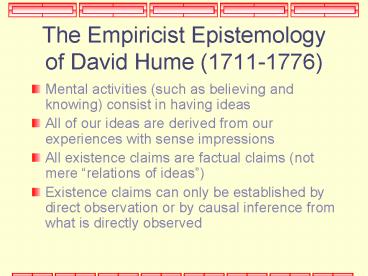The Empiricist Epistemology of David Hume 17111776 - PowerPoint PPT Presentation
The Empiricist Epistemology of David Hume 17111776
The Empiricist Epistemology of David Hume (1711-1776) Mental activities (such as believing and ... Hume's Empiricism Undermines Much That We Claim to Know ... – PowerPoint PPT presentation
Title: The Empiricist Epistemology of David Hume 17111776
1
The Empiricist Epistemology of David Hume
(1711-1776)
- Mental activities (such as believing and knowing)
consist in having ideas - All of our ideas are derived from our experiences
with sense impressions - All existence claims are factual claims (not mere
relations of ideas) - Existence claims can only be established by
direct observation or by causal inference from
what is directly observed
2
Humes Empiricism Undermines Much That We Claim
to Know
- External objects We experience sense
impressions, not objects, and we never observe
objects causing our impressions - Selves We experience sense impressions, not an
enduring, constant, immaterial self having the
sense impressions - Cause and effect We experience a constant
conjunction between sense impressions, never a
necessary connection
3
Immanuel Kant (1724-1804) and the Preconditions
of Experience
- The mind organizes sensations as objects in space
and time - The mind unifies sensations within a single
consciousness (as the experiences of a self) - The mind organizes sensations around concepts
(such as thing, table, or person) - The mind organizes sensations such that all
experience of change is causal in nature
4
Kants Skepticism Differs From Humes
- Universally certain knowledge about the world of
experience (e.g. tables and chairs) is made
possible by knowledge of the minds own
organizing principles - But questions about how things are in themselves,
independent of our experience of them, cannot be
answered the realm of das Ding-an-sich remains
forever unknowable
5
G. W. F. Hegel (1770-1831) and Absolute Idealism
- There is no unknowable reality the real is
rational and the rational is real - All reality is the product and concrete
expression of infinite thought (the Absolute) - Reality is not a collection of individuals but an
all-encompassing thought structure (the
dialectic) unfolding itself in cosmic history - At the apex, Idea and Nature merge into Absolute
Spirit (thought thinking thought)
PowerShow.com is a leading presentation sharing website. It has millions of presentations already uploaded and available with 1,000s more being uploaded by its users every day. Whatever your area of interest, here you’ll be able to find and view presentations you’ll love and possibly download. And, best of all, it is completely free and easy to use.
You might even have a presentation you’d like to share with others. If so, just upload it to PowerShow.com. We’ll convert it to an HTML5 slideshow that includes all the media types you’ve already added: audio, video, music, pictures, animations and transition effects. Then you can share it with your target audience as well as PowerShow.com’s millions of monthly visitors. And, again, it’s all free.
About the Developers
PowerShow.com is brought to you by CrystalGraphics, the award-winning developer and market-leading publisher of rich-media enhancement products for presentations. Our product offerings include millions of PowerPoint templates, diagrams, animated 3D characters and more.































